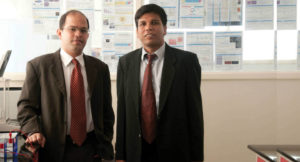Through screening, intervention and monitoring, Diabetacare and its network of physicians, aim to increase awareness around managing diabetes by reaching out to more patients and through mobile technology, manage and monitor their health

It is a well known fact that diabetes is a silent killer. Yet the level of awareness of the associated complications for this disease is quite low. “It is not the disease that is dangerous but its related complications that can lead to issues in human health,” states Dr. Sanjiv Agarwal. In 2012, he decided to focus on chronic disease management and with the rising population of diabetes all over the world, he set up Diabetacare, a 24×7 diabetes care service that utilises mobile technology to manage and monitor diabetic patients’ health.
However, this is not his first venture. Dr. Agarwal has set up several successful technology-enabled healthcare ventures across the U.K. and India. He began his journey by offering radiology reporting services to NHS Hospitals across the U.K. He later took the initiative to set up provision of core clinical dermatology services to NHS in partnership with Hertfordshire Community NHS Trust.
Glaring gaps in diabetes management programs led him to turn his attention to diabetes care. In 2012, he invested in a social enterprise ‘Apnee Sehat’, a spinoff of Warwick University Ventures, established to increase awareness around diabetes among South Asians living in the U.K. Under the venture, he also set up a diabetes education arm providing U.K. University accredited courses for physicians, nurses and nutritionists, focusing on the Middle East and Indian subcontinent market. “As my roots are Indian I wanted to start Diabetacare in India, where there are 70 million people diagnosed with diabetes and this number is expected to rise to more than 100 million plus in the coming years,” says Dr. Agarwal. He continues, “This is a massive problem and is a leading cause for poor quality of life for people. In fact, many patients are not even aware that diabetes leads to blindness and other health issues.”
The company’s primary model is to partner with existing physicians. “We are augmenting their practice by providing our technology and our people to facilitate screening in their clinics and provide intervention through our diabetes educators,” he states. The company has adopted this from the 12-week program for which it has a tie-up with U.K.-based Warwick University.
The company has come out with specific intervention programs which compliment the medicines; screening being the first step followed by intervening, which includes lifestyle intervention programs and finally, monitoring the condition.
With a team size of 200 employees, the company is currently present in 15 cities and has around 100 physician partners.
The three-pronged strategy
The company’s model is based on three pillars – screening, intervention and monitoring. “Diabetes per se does not kill, but complications that arise from it do, such as kidney failure, amputations and so on. Hence, it is important for early screening to detect these complications,” says Agarwal. The company came out with a model wherein it screens the patients, from the eye, heart, kidney to feet, within 60 minutes and then comes out with an intervention plan.
In India, diabetes is mostly controlled through medicines. In western countries, medicine plays only a 33 per cent role in managing diabetes while 66 per cent is lifestyle intervention, out of which nutrition plays a 33 per cent role apart from physical and mental activities. The company has come out with specific intervention programs which compliment the medicines; screening being the first step followed by intervening, which includes lifestyle intervention programs and finally, monitoring the condition. Dr. Agarwal has created a diabetes recording medical record system using Internet of Things and has come out with devices like Glucometer, BP machines and partnered with Vodafone worldwide so that the devices have its SIM card in it and the readings are recorded in the machine. This is a 360 degree loop of diabetes care that the company offers its patients.
Hiccups along the way
“Insurance companies do not cover diabetes and reimbursement is an issue,” says Dr. Agarwal. This apart, since diabetes is a silent disease, awareness is quite low and adoption is poor. There is also the problem of access to quality care which the company is trying to work on. “The challenge is to get people to adopt the service much quicker. It is just a matter of time when they realise the importance of it,” says the optimistic founder.
Growth dynamics
Diabetacare started its first service delivery in August 2013, when the company was still learning and trying to fix teething problems. “Then, we started growing rapidly and found more problems with the growth,” shares Agarwal. This year marks the start of the company’s consolidation period, where it plans to focus on strengthening its presence in existing geographies rather than entering more new geographies. On the international front, the company has entered into some contracts in the Middle-East and U.K. which should be operational in the next few months. “Our approach in these countries will be different as the reimbursement models are different,” says Dr. Agarwal. In the U.K., the reimbursement model is 90 per cent by the government while in India, the company has to directly approach the patient. While the company is not familiar with the Middle-East market, it plans to find a local partner to help with business in this region.
As far its marketing strategy is concerned, Diabetacare plans to focus on below the line activities with a primary approach of doing a lot of screening events to increase awareness. It also plans to arrange short talks in neighbourhood clubs on healthy cooking and lifestyle. Another focus area is social media where it has gained considerable traction.
The path ahead
The company raised US $7 million, which will be deployed in development and growth. “We have a team of 10 who are constantly developing the technology as we go along,” states Dr. Agarwal. Diabetacare will be raising more funds in 2017 to aid its growth further.
As for scaling, the company plans to have a good geographical spread across the U.K., Middle-East and India. In India, the company plans to increase its physician network to 300 by next year and in the next three years, it hopes to have around 1,000 physicians in its network. “By then, the reimbursement model is likely to become more mature and insurance companies may be geared up for OP type of reimbursements. The government may also be better prepared to handle diabetes. And, if the government is willing to provide reimbursements, we may be able to focus on the Tier-II and Tier-III regions in the future,” concludes Dr. Agarwal.
Snapshot
Diabetacare
Founder: Dr. Sanjiv Agarwal
Funding: US $7 million
USP: Mobile technology based diabetes management using screening, intervention and monitoring
Geography: UK, Middle East and India



